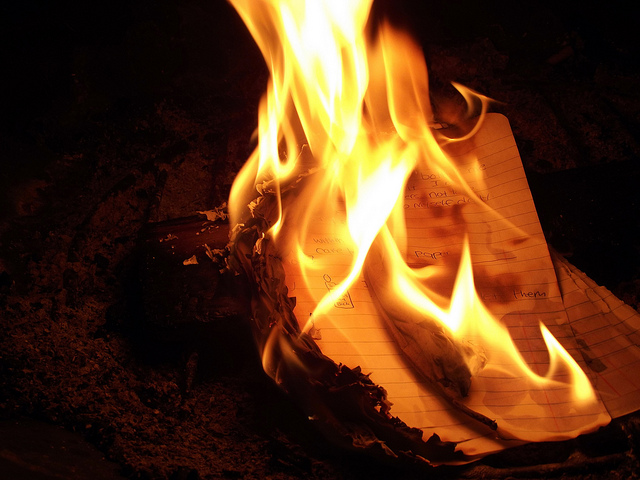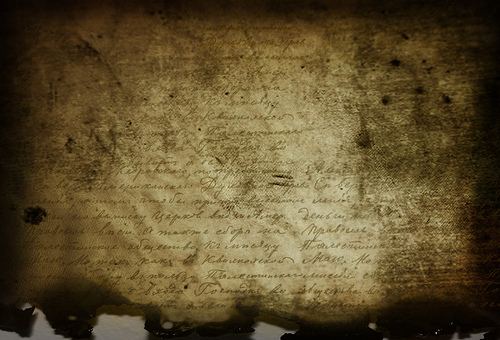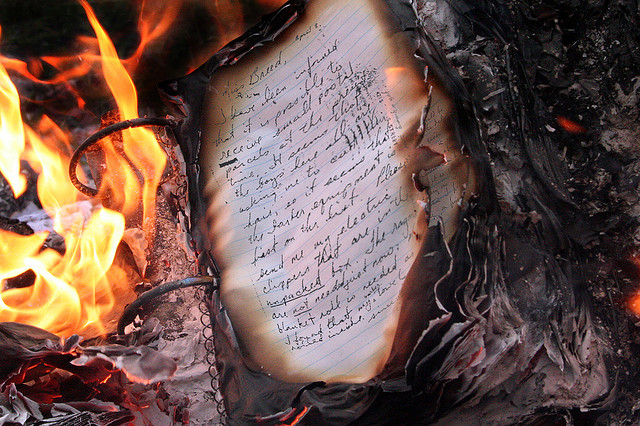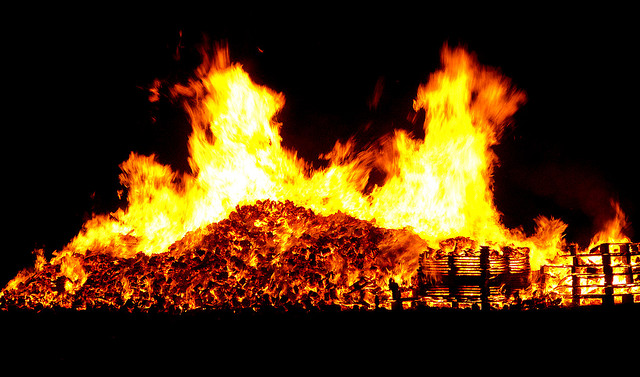TW Column by Steven Lewis
Writers Never Burn Words—Except When They Need To
Next week, TW launches its annual issue on "Writing and Faith"—a topic that's more timely than ever. Here, Steve Lewis confronts why a writer might consign his own words to the flames. Don't miss Steve's poem at the end.

Dead Winter 2014
I kept hearing scurrying and scratching in the ceiling above my cluttered second-story office. When I climbed the pull-down stairs to the frigid attic, I not only discovered mice—and droppings—but flying squirrels soaring across the dark expanse and out the hole they had gnawed in the eaves.
Soon enough, I was crouching and growling, mumbling and stumbling back and forth toward the circle of cold light at the end of the house. Three, four, five times. I eventually chased all the winged rodents outside, closing up the opening with chicken wire and scrap wood, then sat down on some old cartons to catch my breath.
Which was when, mostly out of boredom, I opened a nearby carton. Inside, there were letters, dozens of letters, hundreds of letters, and probably thousands more in the six or seven boxes behind it.
Two hours later, I emerged from the attic shivering on the edge of hyperthermia, having read—and pondered—and reread—and repondered and relived the complicated memories conjured up by…all of six letters mailed to me in the late 1960s from people I barely remembered.
Six letters in two hours!
The next day, I was up there again, and two hours later had read and reread and pondered and repondered…six more letters. Same drill the following day.
• • •
The First Cremation
By Day 4, it was clear I’d never get through more than six letters on any given day. I did the raw arithmetic and concluded it would likely take the rest of my life to read every missive in the cartons.
This was followed by another moment of breathtaking clarity: Upon my death, neither my wife nor my children would ever devote even two hours of their lives to reading and cataloging my almost entirely uneventful correspondence. They’d just burn the whole lot of them.
So, before I fell any farther into the bottomless pit of the past, I started hauling heavy cartons down from the attic, down to the main floor, out across the snowy yard and, with a heave, dumped them into the fire pit. A few hours later, they were smoldering ash littering the white landscape.
Amen.
But not quite. After a half-hearted, half-mournful pat on the back, I plodded up to the attic again to doublecheck on the home invaders, when I noticed, under a tarp, one more dusty carton. More damn letters!?
No. When I brushed away the droppings and opened the flaps of a water-stained Campbell’s Soup box, I found it packed tightly with black sketchbooks—my old journals. I’d kept regular journals from 1967 to around 1992, but in the moment, I couldn’t remember why I’d stopped.
Of course I had to read them. They weren’t someone else’s letters. Every page was filled with my words, my history.
I reached in and opened a journal with the first entry dated 9/27/67. This time, it took two hours to read six entries rather than six letters. Soon enough, with thousands of entries covering 23 formerly blank books, I confronted the same end-of-life conundrum my incinerated correspondence had posed.
And worse—much worse. To my emerging shock and horror, with yellowed page after yellowed page, I learned that my 21-year-old self was appallingly boring…pedestrian…whiny…sophomoric…self-absorbed…self-pitying.
With a shiver, I tossed the 1967 journal back into the carton and went downstairs to mull over the demoralizing realities.
• • •

Déjà Vu All Over Again
The next afternoon, now warm and rested and coffee-ed up, I felt a renewal of spirit. The plan was to go back into that frigid attic and sort through all the journals, put them in chronological order, and then begin skimming through year by year until I found one from a more mature period in my life—perhaps after I’d become a father a few times over or maybe a more serious writer with a few books under his belt. Someone with gravitas.
Unfortunately, I found pretty much the same ink-stained sniveling in 1989 (married more than two decades with seven kids) as I had for the 21-year-old in 1967: entry after disheartening entry of me carping about this, complaining about that, moping about the miserable state of a life overflowing with undeserved grace. As the singer in Ecclesiastes croons, it was all vanity and vexation.
Sitting and shivering on a crate up there in the frigid attic, I could find nothing that provided insight or context for the rich life I’m living today—nothing even to suggest the rough-hewn material for any of my more “mature” work. And clearly nothing that one day might be collected at the University of Wisconsin Library or Wheatley High or even the I U Willets Road elementary school.
Or my children’s bookshelves. They’d burn the lot of them. Perhaps do the Good Riddance dance after reading all the entries with me whining about the burdens of fatherhood. Suddenly, I remembered why I’d stopped keeping a journal in 1992.
I slapped the 1989 cover closed with a puff of dust.
• • •
To Burn or Not to Burn
The next day, I was back in the attic, pondering the writer’s obligation to his or her work, breaking a sweat while considering the importance of process over product, reconsidering my usual thoughts on “murdered darlings.”
I was not—I am not—Anaïs Nin, Franz Kafka, or Joan Didion. There was little, edging up on nothing, in all those entries worth saving. Nothing with the inherent power of my friend John G’s journals—whose deeply compelling reflections on family, his father, Paris, drugs, love, lust, and Proust serve as the potent raw material for unforgettable narratives to be mined.
I can do it. I just incinerated thousands of letters without remorse. But of course I can’t. I just can’t. Writers don’t burn their words. Writers don’t burn books.
Two hours later, I’d resolved only to shove the damn carton back under the tarp and to forget about it.
But in the days and weeks that followed, I was still haunted by Munch-esque visions of my wife and kids finding those embarrassing volumes in the attic after I die. And what about my sixteen grandkids? They’d see their “Chief” pouring out all his stunted, self-absorbed existential angst day by day, year after year—all that bellyaching in oxymoronic contrast to the astoundingly good life he haplessly stumbled into—and did not earn.
I began imagining the inscription they’d carve into my gravestone:
Chief: An Ungrateful and Uninspiring Wretch of a Writer
I taped up the carton and went downstairs for the rest of the winter. And stewed.
• • •

The Bonfire, Summer 2014
I invited all my writer friends to my backyard in the Shawangunk Mountains for the annual Microfest, a gathering to celebrate what Hemingway called “the purity of line.” This year, though, I added a new event: the Journal Burning Bonfire.
At first, no one believed me. They assumed I was joking or being too hard on myself. Some smirked at the utter stupidity or the audacity or cowardice of my plan. Still others sneered at me, as if I were one of Ray Bradbury’s barbaric firemen. But when I insisted, and insisted again, a few confided, wide-eyed, that they’d also love to burn their journals.
When the day came, I built a bonfire. Dozens of writers had shown up for the Microfest, but none brought any journals to burn. So, it was just me—perhaps as it should have been. At the appointed hour, I gathered the anxious crowd, and they followed me in a solemn procession past the swing set and down to the fire pit. We paced slowly and sternly, like townsfolk in westerns showing up at a hangin’.
My friend Lisa stayed back by the house with several others who disapproved or didn’t care. “I don’t think I like this. I don’t like this at all,” she said.
Two minutes later, cameras and iPhones on alert, I tossed the first of the journals into the pit. No one cheered. No one clapped. And no one stepped forward to share in the ceremonial duties. But there were a lot of toothy grins. And fifteen minutes later, the ritualistic cremation had been consummated, flames flipping up around the curling pages, ashes flying in the summer air, my friend John patting me on the back as if what I’d done deserved consolation.
I incinerated all 23 journals that humid afternoon, the first one dating back 47 years.
• • •
The Aftermath, Fall 2015
I’m in the attic again, gathering Halloween decorations. More than a year has passed since I burned the letters. It’s been fifteen months since I threw the first, then the second, then the third journal (and so on) into the fire pit, and the act is still smoldering in my soul.
All that nagging post-post-post-adolescent angst and entitlement driven up in smoke, blowing toward the stream, over the snakes hidden in the tall grasses, beyond the coyotes’ den, the unseen fisher cat creeping along the forest floor, bears waiting for dark—ashes rising above the trees, smoke drifting toward the crag, a cartoonist’s fluffy air balloon floating off with all the words I no longer wish to call back to this cold attic, where I now find myself sweating and as red-faced as the leaves outside these windows.
But not sweating, as you might think, with the hellish torture of unrelenting remorse. No. My heart is racing, my capillaries surging, because of how liberating, audacious, and breathtaking it feels to have let go of the past.
How heartening—how soulful—to stop taking myself so seriously. It’s like walking barefoot through a pile of burning leaves. And after lingering in the memory of all that was said and incinerated, I go downstairs to write.

In My 70th Year
—New Paltz, New York, September 2015
with a nod to Leonard Cohen’s “Hallelujah”
Wandering now barefoot across this meadow, scorching
midday sun, Queen Anne’s lace, purple
loosestrife scratching my ankles, a familiar voice
rising through rustling grasses, saying, You,
you walk toward the silver maple,
beyond which a stone well appears
in a swale of land where urgent thirst
overcomes good sense, and I swing a leg
over the smooth hard edge, slowly,
slowly, toehold by grasping toehold, lowering
myself, clawed fingertips slipping
in, then out, of the damp spaces between round stones
until I am standing at the edge of a stream,
kneeling in moss, cold water dripping
through curled fingers before it reaches
my parched tongue, shafts of sunlight,
glistening bubbles, now lighting the way
around a bend to a mossy hut, a door
swinging open, a man I barely recognize
in a white robe, a sad smile,
opening his arms, his arms around
my shoulders, his warm moist breath against my ear,
that oddly familiar scratchy voice whispering, Time
to cut the crap, Steve. You don’t know
anything about anything, God or karma or Hemingway
or hydrofracking or the military-industrial complex
or the benefits of Coenzyme Q10 or bok choy, I mean Jesus, man,
he says, holding me, breathless now, my sweaty
hands pushing back against the thick love
handles beneath his cool-as-silk robe. You,
you, you damn fool, you who
have written a million, two million words
and still do not know
what makes a good sentence
good or what makes words
wordless as the flight of birds. Shit,
man, you don’t even know why
you are here with me, that bony hand
grabbing my elbow, rushing me
back along the stream,
an angry father, pointing me
back up the damp well
to the sunny meadow,
to the yellow clapboard house
that appears in the shade,
or why I am taking you
to the ones who wait for you
but not your shadow,
who love you
beyond all reason. Beyond
any human understanding. Go
ahead, man! Walk up those steps.
Open the damn door.
Tell them all.
Art Information
- "So, I Decided to Write Down My Feelings" © Scott Miles Love; Creative Commons license.
- "Burned Texture" © obsidiandawn for the handwriting brush; Creative Commons license.
- "The Temperature at Which Books Burn" © .sarahwynne.; Creative Commons license.
- "Three Eleven Naught Seven" © Bill Tyne; Creative Commons license.
 Steven Lewis is a contributing writer and columnist at Talking Writing, a former mentor at Empire State College, current member of the Sarah Lawrence College Writing Institute faculty, and longtime freelancer. His work has been published widely, in journals from the notable to obscure, including the New York Times, Washington Post, Christian Science Monitor, Los Angeles Times, Ploughshares, Narratively, and Spirituality and Health.
Steven Lewis is a contributing writer and columnist at Talking Writing, a former mentor at Empire State College, current member of the Sarah Lawrence College Writing Institute faculty, and longtime freelancer. His work has been published widely, in journals from the notable to obscure, including the New York Times, Washington Post, Christian Science Monitor, Los Angeles Times, Ploughshares, Narratively, and Spirituality and Health.
He’s also literary ombudsman for Writers Read. His recent books include Zen and the Art of Fatherhood, The ABCs of Real Family Values, The Anxious Groom, Fear and Loathing of Boca Raton, and A Month on a Barrier Island. His new novel, Take This, was recently published by Codhill Press.
Visit him online at Steven Lewis’s website or @LewisWrite4hire on Twitter.
